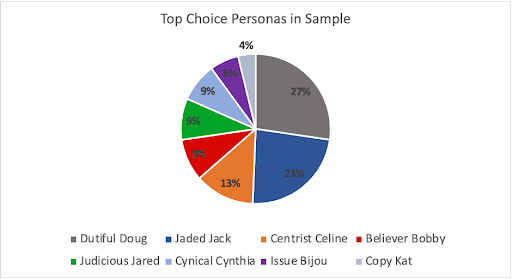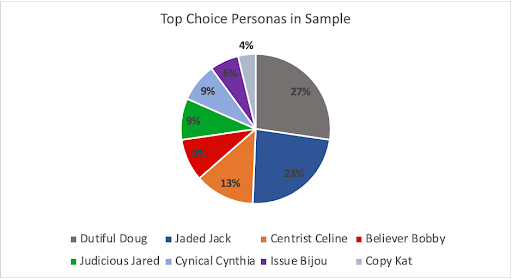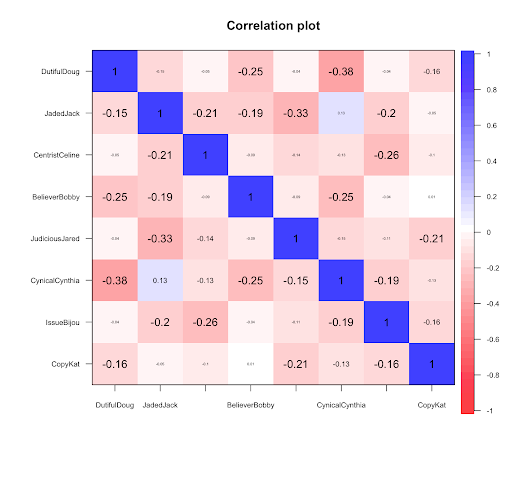
GoodParty.org's 2023 Independent voter report - Part 1
Earlier this month, we asked 530 independent-leaning Americans for their thoughts on American politics. What we learned was surprising and exciting for us here at GoodParty.org, as the opinions of this group indicated a strong appetite for more and better options at the ballot box. This group was broadly frustrated with the state of American politics, with particular ire for the two-party system and the inaction of the political establishment on essential issues.
We’ll cover the opinions of these voters on the top issues of the day, their position on the political spectrum, and more. First, we’ll cover how independent voters categorize themselves.
At GoodParty.org’s team retreat in December 2022, our team discussed potential target user groups. This exercise aimed to determine who are the most likely early community members of our movement to elect more independent and third-party candidates. We left our retreat with 12 different statements that represented high-level personas. After some initial testing, we eventually whittled down the groups to these 8, giving them their name:
Dutiful Doug: I feel it’s my responsibility and civic duty to vote, even though I’m not a fan of either of the two major parties. I vote for the lesser of two evils.
Jaded Jack: I think the system and its politicians are corrupt and broken. I can’t stand voting for the two major political parties, but I haven’t seen a good alternative. I want to get involved, but I don’t know how or what I would do.
Centrist Celine: I believe that compromise is the only way forward for American politics. I tend to support candidates closest to the middle ground on divisive issues.
Issue Bijou: I am very passionate about a particular issue, and I will only vote for candidates that are most closely aligned with this issue (environment, 2A, LGBTQ rights, etc.).
Cynical Cynthia: I don’t pay close or any attention to politics because it’s not worth my time. I care about my community but have other responsibilities that are more demanding. I think I can make more of a difference by getting involved in ways other than politics.
Copy Kat: I want to vote for an independent or alternative party, but I need to see proof and momentum first. Now is not the time to shake things up.
Believer Bobby: Change in American politics is possible with the right reforms and leaders. I talk about political reform and independent/alternative candidates a lot already.
Judicious Jared: I make up my mind about my vote just before the election. I seek as much information as possible to determine how I should vote.
In our survey of independents and reluctant partisans, we asked the group to identify their top user group and rank the eight personas from closest to their views to furthest away.
Here’s what we found:

Two of the target user groups made up slightly more than 50% of the total responses - Jaded Jack and Dutiful Doug. This proportion indicates that the sentiment of voting for the lesser of two evils and a prevailing feeling of not knowing how to make an impact dominate the minds of independent voters.
Independents and disenchanted Republicans and Democrats also indicated that they are free thinkers. Only 4% admitted that following their friends and not wanting to shake up the system are their primary obstacles to voting independently, even if they are sympathetic to the cause. Similarly, only 6% identified themselves as single-issue voters on a particular topic, with a large number indicating that protecting LGBTQ rights, prioritizing the health of the environment, and protecting the Second Amendment are the most common “single-issues” guiding their vote.
22% (Judicious Jared and Centrist Celine) identified themselves as more centrist, ideological, and personality-based independents - they say they are more likely to vote for the most results-oriented and qualified candidate on the ballot.
Only 9% identify with the reformer segment (Believer Bobby) of people committed to voting for independent and third-party candidates. Our team viewed these folks as the most valuable segment to reach.
Lastly, 9% of respondents identified with Cynical Cynthia. This group was the least likely to vote but was the least homogenous in their qualitative responses. Cynthias ranged from people involved in community organizing to busy working people that care about the world but haven’t seen tangible benefits to their lives from electoral politics.

Pictured above is how the personas were ranked on average sorted by the top choice selection. Dutiful Doug and Jaded Jack had strong performances regardless of top choice, with a notable connection between Cynical Cynthias and Jaded Jacks. Copy Kat, Bobby Believer, and Centrist Celine comprise the second grouping, with Issue Bijou and Cynical Cynthia coming in last.
Almost every group ranked Cynical Cynthia last, except for Jaded Jack, who was likelier to rank single-issue and research-oriented voting below. Finally, the two top groups, Dutiful Doug and Jaded Jack exhibited widely different rankings of cynicism, issues, and needing to do their homework on the candidates (Jared, Cynthia, and Bijou) as reasons for identifying as independent.

Finally, this chart shows the correlations between rankings of the different personas. We see almost no positive correlations, suggesting that personas are distinct in participants’ minds. Factor analysis also confirms that persona ratings for each category are statistically unrelated, indicating the uniqueness of these target groups.
In conclusion, independent voters are not a homogenous group. They are, however, unified in their position that the two-party system is broken, and they want to do something about it. Many identify as lesser-of-two-evils voters or people made hopeless by the aimlessness of the two-party system and not knowing what to do about it. Very few identify themselves with a feeling of anxiety to maintain the political status quo. All are fascinating and unique in their own way.
This is just the beginning of the insights we gleaned about them from this survey. Subscribe to our newsletter to read more about what we learned and how you can get involved with our movement to build a home for independent voters and produce strong, independent candidates.

